- Home
- W. Somerset Maugham
The Narrow Corner Page 10
The Narrow Corner Read online
Page 10
A boy brought them bottled beer, and the huge Dane before drinking raised his glass.
“Your very good health, gentlemen.”
Dr. Saunders did not know why the stranger so very much attracted him. It was not only his cordiality, that was common enough in the East: there was something in his personality that pleased.
“Don’t look as if there was much business ’ere,” said Captain Nichols.
“The place is dead. We live on our memories. That is what gives the island its character. In the old days, you know, there was so much traffic that sometimes the harbour was full and vessels had to wait outside till the departure of a fleet gave them a chance to enter. I hope you’ll stay here long enough to let me show you round. It’s lovely. An unsuspected isle in far-off seas.”
The doctor pricked up his ears. He recognized it as a quotation, but could not place it.
“What does that come from?”
“That? Oh, ‘Pippa Passes.’ Browning, you know.”
“How does it happen that you’ve read that?”
“I read a lot. I have plenty of time, you see. I like English poetry best of all. Ah, Shakespeare.” He looked at Fred with a soft, gracious glance, a smile on his great mouth, and began to recite:
“ ‘… of one whose hand,
Like the base Indian, threw a pearl away
Richer than all his tribe; of one whose subdued eyes,
Albeit unused to the melting mood,
Drop tears as fast as the Arabian trees
Their medicinal gum.’ ”
It sounded odd in that foreign accent, somewhat gruff and guttural, but what was odder still was that there a young Danish trader should quote Shakespeare to the shifty scoundrel Captain Nichols and to the oafish lad Fred Blake. Dr. Saunders found the situation faintly humorous. The skipper gave him a wink that signified quite clearly that this was a queer fish, but Fred Blake flushed and looked shy. The Dane had no notion that he had done anything to excite surprise. He went on eagerly.
“The old Dutch merchants were so rich here in the great days of the spice trade, they didn’t know what to do with their money. There was no cargo for the ships to bring out and so they used to bring marble and use it for their houses. If you’re not in a hurry I’ll show you mine. It used to belong to one of the perkeniers. And sometimes, in winter, they’d bring a cargo of nothing but ice. Funny, isn’t it? That was the greatest luxury they could have. Just think of bringing ice all the way from Holland. It took six months, the journey. And they all had their carriages, and in the cool of the evening the smart thing was to drive along the shore and round and round the square. Someone ought to write about it. It was like a Dutch Arabian Nights Tale. Did you see the Portuguese fort as you came in? I’ll take you there this afternoon. If there is anything I can do for you, you must let me know. I shall be very glad.”
“I shall get my traps,” said the doctor. “These gentlemen have very kindly given me a passage here. I don’t want to put them out more than I can help.”
Erik Christessen beamed amiably on the other two. “Ah, that is what I like in the East. Everyone is so nice. Nothing is too much trouble. You cannot imagine the kindness I’ve received at the hands of perfect strangers.”
The four of them got up and the Dane told the half-caste manager that Dr. Saunders would be coming along in a little while with his luggage and his boy.
“You should have tiffin here. It is reistafel to-day, and they make it very well. I shall be here.”
“You two fellows had better have tiffin with me,” said the doctor.
“Reistafel’s death to me,” said Captain Nichols. “But I don’t mind sittin’ and watch you eat it.”
Erik Christessen solemnly shook hands with the three of them.
“I’m so very glad to have met you. It’s not often we get strangers on the island. And it’s always a pleasure to me to meet English gentlemen.”
He gave them a bow as they separated at the bottom of the steps.
“Intelligent chap, that,” said Captain Nichols when they had walked a little. “Knew we was gentlemen at once.”
Dr. Saunders gave him a glance. There was no trace of irony in his expression.
xvi
A COUPLE of hours later, the doctor having settled in, he and his guests off the Fenton were sitting on the verandah of the hotel drinking a glass of Schnapps before tiffin.
“The East ain’t what it was,” said the skipper, shaking his head. “Why, when I was a young chap, at Dutch ’otels there’d be bottles of Schnapps on the table, at tiffin and dinner, and you just ’elped yourself. Free of charge it was. And when you’d finished the bottle you told the boy to bring another.”
“Must have come expensive.”
“Well, you know, that’s the funny thing, it didn’t. You very seldom found a chap as took advantage of it. Human nature’s like that. Treat a man proper and ’e’ll respond wonderfully. I believe in ’uman nature, I always ’ave.”
Erik Christessen came up the steps, took off his hat to them and was passing into the hotel.
“Come and have a drink with us,” called Fred.
“With pleasure. I’ll just go in and wash first.”
He went in.
“Hulloa, what’s this?” said the skipper, eyeing Fred slyly. “I thought you didn’t like strangers?”
“It depends. Seems rather a good sort to me. He never asked us who we were or what we were doing here? Generally everyone’s so curious.”
“He has naturally good manners,” said the doctor.
“What’ll you have?” asked Fred when the Dane rejoined them.
“The same as you.”
He dropped his ungainly bulk into a chair. They began to chat. He said nothing that was very clever or amusing, but there was a guilelessness in his conversation that made it pleasing. He filled you with confidence. He irradiated well-being. Dr. Saunders did not judge hastily, and he mistrusted his instincts, but this he could not miss and, reflecting upon it, he could ascribe it to nothing but an amazing and delightful sincerity. It was quite obvious that Fred Blake was much taken with the huge Dane. Dr. Saunders had never heard him talk so easily.
“Look here, you’d better know our names,” he said after a few minutes. “Mine’s Blake, Fred Blake, and the doctor’s called Saunders, and this fellow is Captain Nichols.”
Somewhat absurdly Erik Christessen got up and shook hands all round.
“I’m very pleased to make your acquaintance,” he said. “I hope you’re going to stay here a few days.”
“Are you still sailing to-morrow?” asked the doctor.
“Nothing to stay for. We saw a dinghy this morning.”
They went into the dining-room. It was cool and dim. Punkahs drawn by a small boy fitfully stirred the air. There was one long table, and at one end of it were sitting a Dutchman with a half-caste wife, a stout woman in loose pale draperies, and another Dutchman with a dark enough skin to suggest that he, too, had native blood in him. Erik Christessen exchanged polite greeting with them. They gave the strangers an incurious stare. Reistafel was served. They piled their plates with rice and curry, fried eggs, bananas and a dozen strange concoctions that boys kept bringing them. When everything was handed they were faced with a mountain of food. Captain Nichols looked at his with profound distaste.
“This’ll be my death,” he said solemnly.
“Don’t eat it, then,” said Fred.
“I must keep up me strength. Where would you be now if I ’adn’t ’ad me strength when we struck that bad weather? It’s not for my sake I’m eatin’ it. It’s for yours. I don’t take a job unless I know I can do it, and not me worst enemy can say I spare meself.”
Gradually the piles of food diminished, and Captain Nichols with stubborn determination cleaned up his plate.
“God, we haven’t had a meal like this for weeks,” said Fred.
He ate voraciously, with a boy’s appetite, and enjoyed his food. They drank beer.
/>
“If I don’t suffer for this it’ll be a miracle,” said the skipper.
They had their coffee on the verandah.
“You’d better have a sleep now,” said Erik, “and then when it’s cooler I’ll come round and show you the sights. Pity you’re not staying a bit longer. It’s a beautiful walk up the volcano. You can see for miles. The sea and all the islands.”
“I don’t see why we shouldn’t stay till the doctor sails,” said Fred.
“Suits me,” said the skipper. “After all the ’ardships of life on the ocean wave this is a bit of all right. I’m not sure if a drop of brandy wouldn’t settle that reistafel now I come to think of it.”
“Trading, I suppose?” asked the Dane.
“We’re prospectin’ for shell,” said the skipper. “Got to find some new beds. There’s a fortune for anyone who’s lucky.”
“D’you have any papers here?” asked Blake. “In English, I mean.”
“Not London papers. But Frith gets a paper from Australia.”
“Frith. Who’s Frith?”
“He’s an Englishman. He gets a bundle of Sydney Bulletins every mail.”
Fred went strangely pale, but what the emotion was that blanched his cheek, who could tell?
“D’you think there’s a chance of my having a squint at them?”
“Of course. I’ll borrow them or I’ll take you up there.”
“How old’s the latest?”
“It oughtn’t to be very old. A mail came in four days ago.”
xvii
LATER, when the heat of the day was passed and his own work finished, Erik fetched them. Dr. Saunders was sitting alone with Fred, for the skipper, suffering from a violent attack of indigestion, had announced that he didn’t want to see no bloody sights and had returned to the lugger. They sauntered through the town. There were more people about than in the morning. Now and then Erik took off his hat to a sunburned Dutchman who walked with a stout and listless wife. There were few Chinese, for they do not settle where no trade is, but a number of Arabs, some in smart tarbouches and neat suits of duck, others in white caps and sarongs; they were dark-skinned, with large shining eyes, and they had the Semitic look of the merchants of Tyre and Sidon. There were Malays, Papuans and half-castes. It was strangely silent. The air was heavy with fatigue. The grand houses of the old perkeniers, in which dwelt now the riff-raff of the East from Baghdad to New Hebrides, had the shamefaced look of respectable citizens who could not pay their rates. They came to a long white wall, all crumbling away, and this once had been a Portuguese monastery; and then to a ruined fort of great grey stones overrun with a wild jungle of trees and flowering shrubs. There was a wide space in front of it, facing the sea, where grew huge old trees, planted it was said by the Portuguese, casuarinas, kanaris and wild figs; and here, after the heat of the day, they had been used to ramble.
Panting a little, for he was somewhat inclined to corpulence, the doctor with his companions ascended the hill on which stood the stronghold, grey and bare, which had commanded the harbour. It was surrounded by a deep moat and the only doorway was high from the ground, so that they had to climb a ladder to enter. Inside the great square walls was the keep, and in this were large and well-proportioned chambers, with windows and doorways of a style that suggested the later Renaissance. Here officers and garrison dwelt. From the upper towers was a spacious and magnificent view.
“It’s like Tristan’s castle,” said the doctor.
The day was softly dying, and the sea was as wine-dark as the sea on which Odysseus sailed. The islands, encircled by the smooth and shining water, had the rich green of a vestment in the treasury of a Spanish cathedral. It was a colour so bizarre and sophisticated that it seemed to belong to art rather than to nature.
“Like a green thought in a green shade,” murmured the young Dane.
“They’re all right from a distance,” said Fred, “those islands, but when you go there—my God! At first I used to want to land. They looked fine from the sea. I thought I’d like to live on one of them for the rest of my life, away from everyone, if you know what I mean, just fishing and keeping my own chickens and pigs. Nichols laughed his head off, said they were lousy, but I insisted on seeing for myself, oh, half a dozen we must have gone to before I gave it up as a bad job. When you got to one of them and went on shore, it all went, I mean, it was just trees and crabs and mosquitoes. It slipped through your fingers so to speak.”
Erik looked at him with his soft beaming eyes, and his smile was sweet with goodwill.
“I know what you mean,” he said. “It’s always a risk to put things to the test of experience. It’s like the locked room in Bluebeard’s castle. One’s all right so long as one keeps clear of that. You have to be prepared for a shock if you turn the key and walk in.”
Dr. Saunders listened to the conversation of the two young men. He was perhaps a cynic, and his withers were unwrung at many of the misfortunes that affect men, but he had a peculiar feeling for youth, perhaps because it promised so much and lasted too short a time, and it seemed to him that there was in the bitterness it experiences when reality breaks upon its illusions something more pathetic than in many graver ills. Notwithstanding the clumsy expression he understood what Fred meant and gave the boy’s emotion the tribute of a sympathetic smile. As he sat there, in the mellow light, in his singlet and khaki trousers, with his hat off so that you saw his dark curling hair, he was astonishingly handsome. There was something appealing in his beauty so that Dr. Saunders, who had thought him a rather dull young man, felt on a sudden kindly disposed to him. Perhaps it was his good looks that deceived him, perhaps it was due to the companionship of Erik Christessen, but at that moment he felt that there was in the lad a strain of something he had never suspected. Perhaps there was there the dim groping beginning of a soul. The thought faintly amused Dr. Saunders. It gave him just that little shock of surprise that one feels when what looked like a twig on a branch suddenly opens wings and flies away.
“I come up here almost every evening to watch the sunset,” said Erik. “To me all the East is here. Not the East of story, the East of palaces and sculptured temples and conquerors with hordes of warriors, but the East of the beginning of the world, the East of the garden of Eden, when men were very few, simple and humble and ignorant, and the world was just waiting, like an empty garden for its absent owner.”
He had a way, that hulking, plain young man, of talking in a lyrical manner that would have been disconcerting if you had not had the feeling that it was as natural to him as to talk of pearl shell and copra and bêche de mer. His grandiloquence was a trifle absurd, but if it made you smile it was with kindliness. He was strangely ingenuous. The prospect was so lovely, the place they sat in, that gaunt, ruined Portuguese fort, so romantic, that there high strains seemed not unfitting. Erik passed his great heavy hand gently over one of the huge blocks of stone.
“These stones and what they’ve seen! They have one great advantage over those islands of yours, you can never discover their secret. You can only guess. And you can guess so little. No one knows anything here. Next time I go back to Europe I shall go to Lisbon and see what I can find out of the fellows who lived here.”
Of course romance was there, but it was vague, and in your ignorance you could only form pictures as blurred as ill-developed snapshots. It was on those towers that the Portuguese captains had stood, scanning the sea for the ship from Lisbon that brought them blessed news of home, or watched with apprehension the Dutch vessels that came to attack them. In your mind’s eye you saw those gallant, swarthy men, in breast plate and hauberk, who carried their adventurous lives in their hands, but they were lifeless shadows, and they owed their substance only to your fancy. There were still the ruins of the little chapel where every day the miracle of transubstantiation took place and whence the priest in his vestments came, during a siege, to administer supreme unction to the soldiers who lay dying on the ramparts. The imagination was tremulo
us with an indistinct impression of hazard and cruelty and dauntless courage and self-sacrifice.
“Aren’t you ever home-sick?” asked Fred presently.
“No. I often think of the little village from which I come, with black and white cows in the green pastures, and of Copenhagen. The houses in Copenhagen with their flat windows are just like smooth-faced women with large, short-sighted eyes, and the palaces and the churches look as if they had come out of a fairy tale. But I see it all like a scene in a play, it is very clear, and amusing, but I don’t know that I want to step on to the stage. I am quite willing to sit in my dark seat in the gallery and watch the spectacle from far away.”
“After all, one’s only got one life.”
“That is what I think, too. But life is what you make it. I might have been a clerk in an office, and then it would have been more difficult, but here, with the sea and the jungle, and all the memories of the past crowding in upon you, and these people, the Malays, the Papuans, the Chinese, the stolid Dutch, with my books and as much leisure as if I were a millionaire—good heavens, what can the imagination want more?”
Fred Blake looked at him for a moment, and the effort of unaccustomed reflection made him frown. When he understood what the Dane meant, his surprise was evident in his voice.
“But that’s all make believe.”
“It’s the only reality there is,” smiled Erik.
“I don’t know what you mean by that. Reality’s doing things, not dreaming about them. One’s only young once, one must have one’s fling, and everyone wants to get on. One wants to make money, and have a good position and all that sort of thing.”
“Oh, no. What does one do things for? Of course one has to work a certain amount to earn one’s living, but after that, only to satisfy the imagination. Tell me, when you saw those islands from the sea and your heart was filled with delight, and when you landed on them and found them a dreary jungle, which was the real island? Which gave you most, and which are you going to treasure in your memory?”

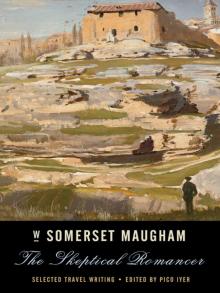 The Skeptical Romancer: Selected Travel Writing
The Skeptical Romancer: Selected Travel Writing The Summing Up
The Summing Up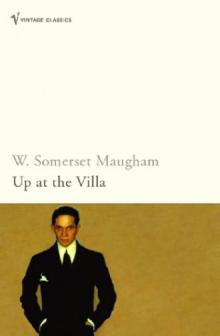 Up at the Villa
Up at the Villa The Razor's Edge
The Razor's Edge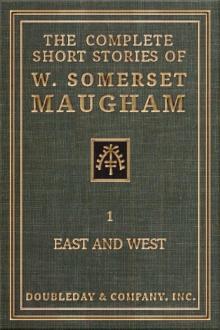 The Complete Short Stories of W. Somerset Maugham: East and West (Vol. 1 of 2))
The Complete Short Stories of W. Somerset Maugham: East and West (Vol. 1 of 2))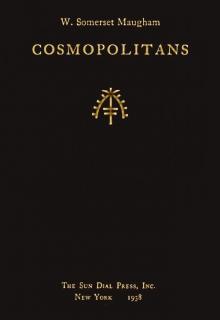 Cosmopolitans
Cosmopolitans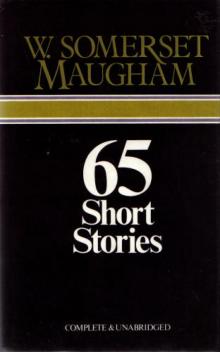 65 Short Stories
65 Short Stories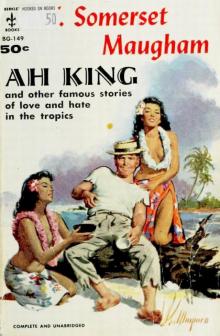 Ah King (Works of W. Somerset Maugham)
Ah King (Works of W. Somerset Maugham)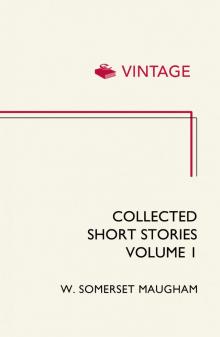 Collected Short Stories: Volume 1
Collected Short Stories: Volume 1 Collected Short Stories Volume 2
Collected Short Stories Volume 2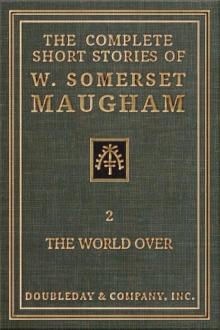 The Complete Short Stories of W. Somerset Maugham - II - The World Over
The Complete Short Stories of W. Somerset Maugham - II - The World Over Collected Short Stories Volume 4
Collected Short Stories Volume 4 Theatre
Theatre Short Stories
Short Stories Then and Now
Then and Now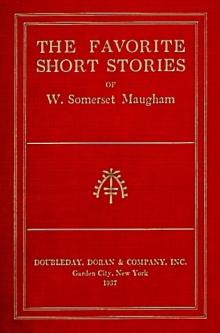 The Favorite Short Stories of W. Somerset Maugham
The Favorite Short Stories of W. Somerset Maugham Of Human Bondage
Of Human Bondage The Magician
The Magician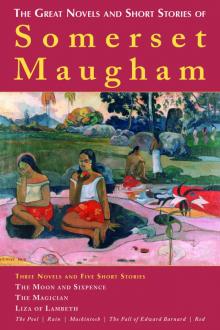 The Great Exotic Novels and Short Stories of Somerset Maugham
The Great Exotic Novels and Short Stories of Somerset Maugham A Writer's Notebook
A Writer's Notebook Christmas Holiday
Christmas Holiday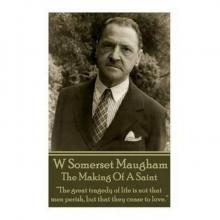 The Making of a Saint
The Making of a Saint Merry Go Round
Merry Go Round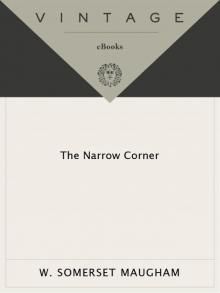 The Narrow Corner
The Narrow Corner Collected Short Stories Volume 3
Collected Short Stories Volume 3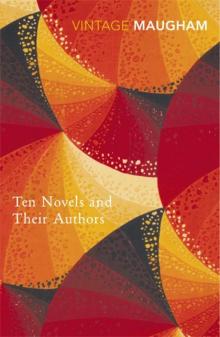 Ten Novels and Their Authors
Ten Novels and Their Authors Ashenden
Ashenden The Moon and Sixpence
The Moon and Sixpence Cakes and Ale
Cakes and Ale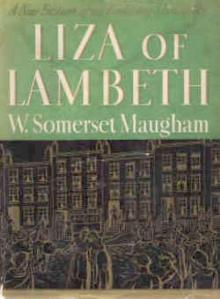 Liza of Lambeth
Liza of Lambeth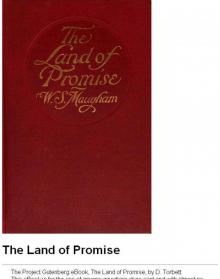 The Land of Promise: A Comedy in Four Acts (1922)
The Land of Promise: A Comedy in Four Acts (1922) A Writer's Notebook (Vintage International)
A Writer's Notebook (Vintage International)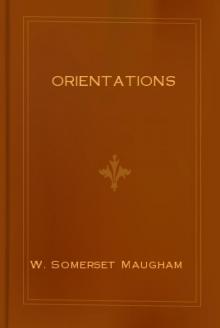 Orientations
Orientations Selected Masterpieces
Selected Masterpieces Mrs Craddock
Mrs Craddock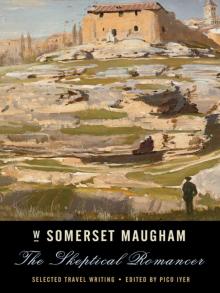 The Skeptical Romancer
The Skeptical Romancer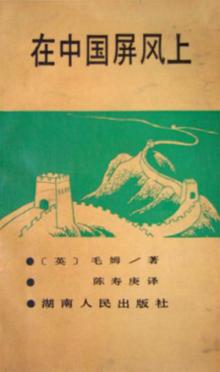 On a Chinese Screen
On a Chinese Screen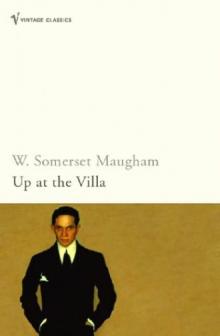 (1941) Up at the Villa
(1941) Up at the Villa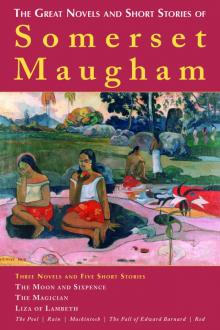 The Great Novels and Short Stories of Somerset Maugham
The Great Novels and Short Stories of Somerset Maugham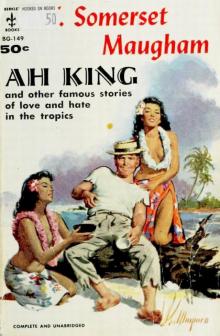 Ah King
Ah King The Explorer
The Explorer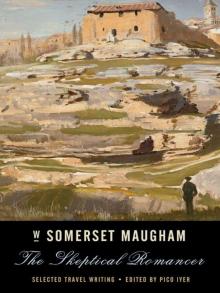 The Skeptical Romancer: Selected Travel Writing (Vintage Departures)
The Skeptical Romancer: Selected Travel Writing (Vintage Departures)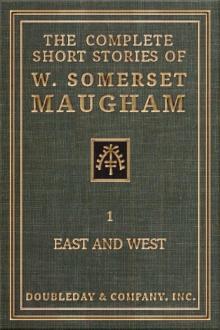 The Complete Short Stories of W. Somerset Maugham - I - East and West
The Complete Short Stories of W. Somerset Maugham - I - East and West